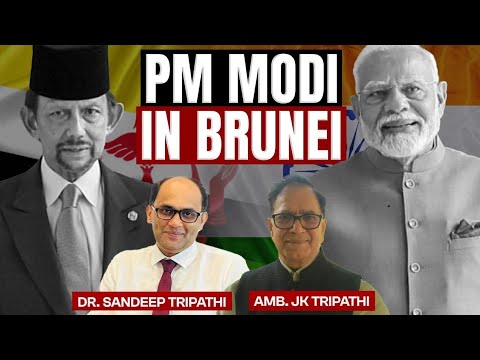Title: Prime Minister Modi’s Historic Visit to Brunei and Singapore Date: October 2024
Host: Forum for Global Studies
GuestSpeaker: AmbassadorJKTripathi Moderator: ForumforGlobalStudiesPodcastTeam
Overview:
The Forum for Global Studies podcast featured Ambassador JK Tripathi, an expert on Indian diplomacy, who discussed Prime Minister Narendra Modi’s recent visit to Brunei and Singapore. This marked the first-ever visit by an Indian Prime Minister to Brunei, underscoring India’s growing focus on Southeast Asia, particularly through its “Act East” policy. The conversation highlighted the strategic, economic, and cultural importance of these countries in India’s foreign relations.
Key Highlights:
- Historical Context:
- India’s Neglect of Smaller Nations: Ambassador Tripathi mentioned that despite the importance of Southeast Asia, no Indian Prime Minister had ever visited Brunei until PM Modi’s recent trip. This was surprising given the economic and cultural ties that India shares with these nations. Historically, Indian foreign policy has prioritized large powers, often overlooking smaller but geopolitically critical countries like
- Prime Minister Modi’s Shift in Strategy: Over the last 10 years, Modi’s government has corrected this oversight by focusing on smaller countries, including Brunei, Australia, and others, to enhance India’s global
II. Economic and Strategic Importance of Brunei:
- Trade and Investment: Brunei, although a small country in terms of population (approximately 465,000), holds significant importance for India, particularly in sectors like oil and gas. India imports both oil and gas from Brunei, with bilateral trade reaching approximately $13
- ASEAN and Indo-Pacific Strategy: Brunei, a founding member of ASEAN, plays a critical role in India’s engagement with Southeast Asia. Its membership in multiple international organizations like the Commonwealth, OIC, and APEC further emphasizes its importance in India’s foreign
III. India’s Soft Power Influence:
- Cultural Ties: India has had strong historical and cultural links with Southeast Asia, dating back to ancient times, such as the shared heritage with places like Java, Sumatra, and Champa (Vietnam). This cultural diplomacy continues to be a key asset for India in maintaining favourable relations with ASEAN
- Indian Diaspora in Brunei: There are over 14,000 Indians residing in Brunei, contributing to the country’s Ambassador Tripathi highlighted that six Indians have received the prestigious Pravasi Bharatiya Samman Award in recognition of their contributions in Brunei, underscoring the influence of the Indian community.
IV. China’s Influence in Southeast Asia:
- China’s Economic Dominance: The discussion also touched upon China’s significant financial presence in Southeast Asia, particularly through its investments in ASEAN While India’s economic engagement has grown, it does not match China’s scale of investment.
- Debt-Trap Diplomacy: Ambassador Tripathi discussed how China’s debt-trap diplomacy—luring smaller countries with loans and imposing difficult conditions later—has made countries like Malaysia, Vietnam, and the Philippines wary of Beijing’s In contrast, India offers an alternative approach based on mutual respect and non-interference.
V. India’s Unique Position in Southeast Asia:
- Non-Expansionist Approach: Unlike China, India’s foreign policy has never focused on territorial or political expansion. Instead, India emphasizes cultural ties and mutually beneficial partnerships. This non-imperialistic stance has built trust with Southeast Asian countries, making India an attractive
- Opportunities for Growth: Despite India’s financial limitations compared to China, Ambassador Tripathi emphasized the need for India to capitalize on its goodwill, especially in sectors like defense, IT, and digital infrastructure. Expanding cooperation in these areas could enhance India’s footprint in the region, particularly in countries wary of China’s
VI. India’s Multilateral Engagement:
- ASEAN and Indo-Pacific: India’s Indo-Pacific vision aligns closely with ASEAN’s principles, creating room for greater cooperation. Ambassador Tripathi highlighted that Brunei’s participation in key multilateral platforms such as ASEAN, the WTO, and APEC, aligns with India’s strategic
- India’s Growing Influence: While China’s investments overshadow India’s in many ASEAN countries, India’s influence, particularly through cultural diplomacy and strategic collaboration, continues to grow. The Prime Minister’s visit signals India’s long-term commitment to the
Conclusion:
Ambassador JK Tripathi’s insights emphasized the significance of Prime Minister Modi’s visit to Brunei as part of India’s broader engagement with Southeast Asia. The visit marked a turning point in India’s diplomatic efforts to strengthen relations with smaller ASEAN nations,
especially in the context of growing competition with China. By leveraging its soft power, cultural diplomacy, and non-expansionist approach, India is well-positioned to deepen its ties with the region, advancing its strategic and economic interests in the Indo-Pacific.
This event underscores India’s evolving role in Southeast Asia, focusing on collaborative partnerships, economic engagement, and fostering trust through cultural and historical connections.

